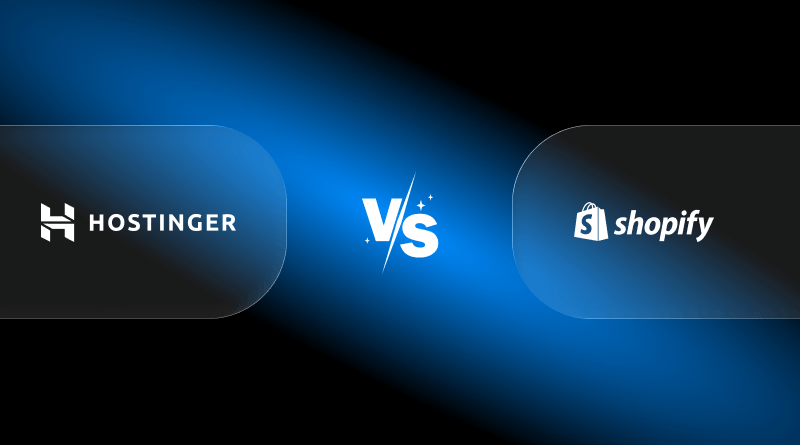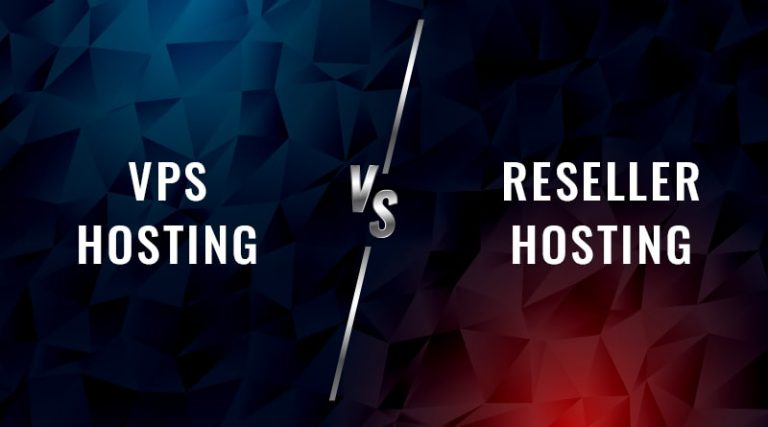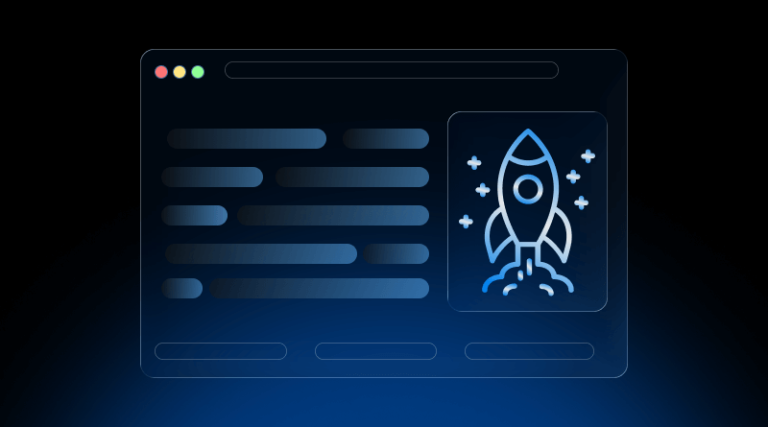Building an online presence is a strategic decision for your blog website like an eCommerce store, as both demand similar effort and resources. Yet, the blog distinguishes two brands. While choosing an apt platform, it is the tussle between Hostinger and Shopify that matters. Hostinger is a Lithuania-based web hosting brand with myriad services. Shopify is your eCommerce partner that crafts your online store.
Hostinger is part of our best web hosting providers list, while Shopify suits our eCommerce hosting users. Now, let’s compare them in terms of features, pricing, functionality, and other factors. The right comparison blog of Hostinger vs Shopify is here. Deep dive into it.
Table Of Content
What is Hostinger?
Originating in 2004, Lithuania, Hostinger has raised the bar in the web hosting industry. The firm’s portfolio includes different web hosting. It includes shared hosting, VPS hosting, cloud hosting, an AI website builder, and others. Other add-on services like domains and business email are essential foundational resources to build a legitimate online brand. This flexibility allows users to curate everything from blogs and digital storefronts.
What is Shopify?
Shopify is an online platform to create your digital storefront. It allows businesses to sell their products/services online or in person. It also emerges as the Hostinger alternative. This eCommerce platform offers tools for building online stores, managing inventory, processing payments, and marketing. From small startups to global brands, Shopify is a go-to online store builder for everyone. It demands no coding and yet delivers a robust marketplace of apps and features. The user experience of the store built on it is highly optimized and intuitive.
Hostinger Features
1. LiteSpeed Performance Optimization
LiteSpeed accelerates the website’s performance by deploying advanced caching technologies and plugins. Now, the fact is that not all web hosts like Hostinger or MilesWeb are 100% compatible with the plugin. But both web hosts have LSCache and the LiteSpeed plugin to optimize websites completely.
2. Beginner-friendly Managed WordPress Hosting
Hostinger provides a complete managed WordPress experience for beginners. They offer a hPanel control panel that allows admins to perform several technical functionalities:
- One-click Force HTTPS feature
- Activating Maintenance mode with a click
- Enabling LiteSpeed with the best configuration
- Buttons for Object Caching & Flush cache
- Enabling Automatic WordPress Updates
- Setting up a staging environment with a single click
- Updating Plugins & Themes within hPanel
- Automated Migration is a significant advantage
- WordPress multisite support and more
3. Security Features
Compromising on website security is non-negotiable. Hostinger leverages advanced security mechanisms like free, lifetime SSL certificate that is automatically applied to all websites, and enterprise-grade DDoS protection at the server level. Other security features that complement protection are:
- Cloudflare DNS
- Vulnerability detection in Plugins & Themes
- Domain WHOIS Protection
- 2FA
- IP Blocking
4. Enough Resources for All Types of Websites
Resource-intensive websites require more resources. Thus, Hostinger offers SSD storage with unlimited bandwidth. The disk space varies according to the size of the plan or budget. Their shared hosting plan has up to 100 GB NVMe disk allocation. Other details like RAM and CPU cores are available in the hPanel dashboard itself.
Shopify Features
1. Easy-to-Use Interface
Shopify is a user-friendly eCommerce store builder for beginners. Its clean and intuitive dashboard allows admins to manage inventory, orders, and customers without any technical skills. The drag-and-drop functionality makes setting up a store quick and efficient.
This process reduces the learning curve and lets business owners focus on sales. The technical overhead measures are reduced by guided steps and built-in tips available on the online store. Shopify ensures that even first-time entrepreneurs can launch their online store with confidence.
2. Customizable Themes & Template
Shopify has a suite of professionally designed themes (free and paid). It gives your store a polished look. Those themes are responsive, ensuring the website’s user experience is overwhelming across devices.
Online retailers use themes to reflect their brand identity. Shopify has customized design features that include colors and fonts, layouts and navigation, thus creating a unique shopping experience for the customers.
3. Built‑in Payment Solutions
Shopify Payments has enabled payment processing of major credit cards, debit cards, and digital wallets inside the store, eliminating the need to use third-party payment gateways and simplifying transaction processes.
Shopify also supports over one hundred external payment gateways around the world to enterprises that require more flexibility, allowing customers to have a variety of payment methods, increasing the level of trust, and boosting the rate of checkout conversion.
4. Scalable Applications and Integrations
Shopify has an application store that hosts thousands of applications that expand the capabilities of the store.
From inventory management to email marketing, the platform covers all of them. So, businesses don’t have to switch to multiple platforms and ensure a skyrocketed growth.
These integrations cover almost every aspect of eCommerce, SEO tools, analytics, dropshipping, customer reviews, and more. With one-click installation, Shopify ensures businesses can add new features seamlessly and stay competitive.
Price Comparison: Hostinger vs Shopify
| Feature Category | Hostinger (Business Web Hosting/Builder) | Shopify (Basic Plan – Most Common Starter) |
| Primary Focus | Affordable web hosting & beginner website builder (e-commerce is a feature) | Dedicated e-commerce platform |
| Lowest Starting Price (Intro Rate) | £1.25/mo (48-month term) | £12.53/mo (annual billing) |
| Best For | Beginners, small businesses, bloggers, portfolios who want an affordable site with light e-commerce capability. | Dedicated online stores, businesses focused on scaling e-commerce, and high-volume sales. |
| E-commerce Cap | Limited | Up to 200 inventory locations |
| Transaction Fees (Using a Third-Party Payment Gateway) | Varies by payment gateway (e.g., Stripe, PayPal) | 2% (basic plan) – this is an extra fee added by Shopify. |
| Staff Accounts | Not typically a standard feature on the basic web hosting/builder plans. | 2 staff accounts |
| Website/Store Builder | AI website builder (drag-and-drop, user-friendly) or standard CMS (WordPress, etc.) | E-commerce focused theme editor (section-based) |
| Apps & Integrations | Integrates with many apps (especially with WordPress/WooCommerce), but fewer built-in tools than Shopify. | Massive app store (over 8,000 apps) for deep e-commerce functionality. |
| Hosting & Domain | Managed hosting included. Free domain for the first year. | Managed unlimited hosting with the custom domain. |
| Security | Free SSL, DDoS protection, weekly/daily backups (depending on plan) | Free SSL, PCI DSS compliant (essential for payments), fraud analysis |
Major USPs
Both platforms have distinctive features and use cases. In this section, we will be talking about their major USP that makes them different from each other.
– Best Templates: Shopify
Online stores can benefit from Shopify’s templates and designs. A book (or website) is judged by its cover, so it’s important your site looks professional and modern. There are over 800 templates available on Shopify pre-configured with their plans. You can easily create polished storefronts and customer messages with business-ready templates and themes. Besides website templates, newsletter templates are also available that make your email marketing campaign easier.
– Best AI Website Builder: Hostinger
Shopify’s AI website builder is available for a trial rate of just £0.17/mo for the first three months. After that, the standard subscription price of £16.67/mo plus tax will apply. But Hostinger beats Shopify in this parameter. The web hosting brand extends a helping hand to beginners with their user-friendly AI website builder plans. Their cost-effective plans start at £0.74/mo (4 months’ term).
Hostinger is suitable for your online presence and managing a storefront. Whereas Shopify only serves the eCommerce objectives. So, you need to determine the right tool that aligns perfectly with your business stage, technical skills, and budget.
Beginners like freelancers, gig workers, or budget-constrained clients can opt for Hostinger. It offers a significantly lower cost, a user-friendly website builder, and managed web hosting services that diminish the entry barrier for users.
Shopify is meant for the scalability of the digital storefront. It is a superior investment if considered for inventory management, integrated multi-channel selling, advanced analytics, and a powerful, reliable app marketplace.
Ultimately, the right online partner depends on your goals and IT expertise. Choose Hostinger for affordability and simplicity, and choose Shopify for power, scalability, and dedicated e-commerce features.
FAQs
1. Is Hostinger or Shopify better for beginners to start an online store?
Shopify tends to be a better fit with beginners since it has an all-in-one solution, e-commerce focus and is better to use.
2. Which is cheaper, Hostinger or Shopify, for an e-commerce website?
Hostinger (usually with WooCommerce) is much cheaper than Shopify to start a small e-commerce business.
3. Which platform is better for dropshipping, Hostinger or Shopify?
The better choice between dropshipping and Shopify is based on the wider range of dedicated applications and integrated capabilities that were designed to support that format of businesses.
4. Can I scale my online business with Hostinger as it grows, or is Shopify better?
Its sophisticated e-commerce software and infrastructure make Shopify better suited to scalability over the long term and dealing with fast growth.














